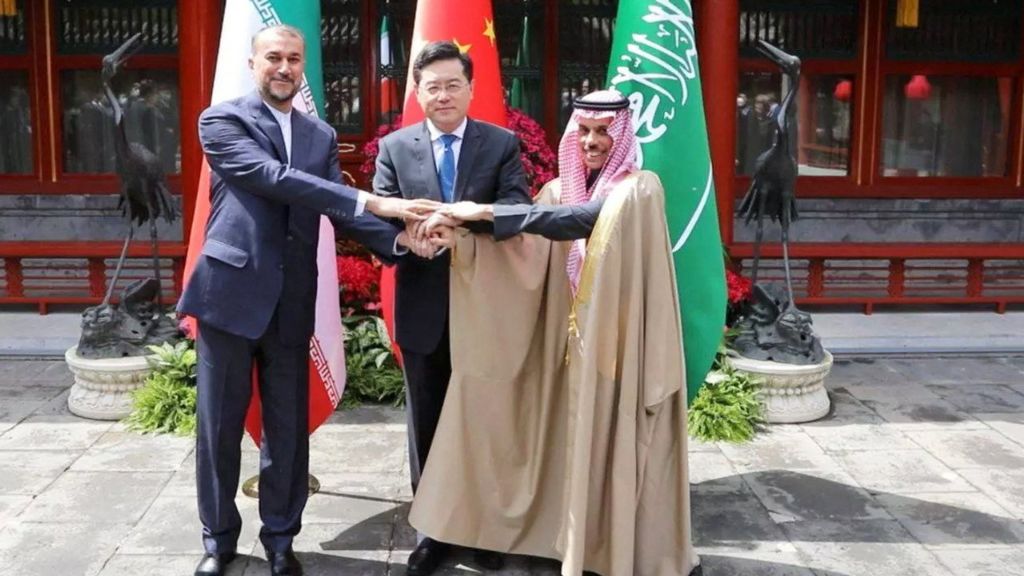Rivals Iran and Saudi Arabia hold first high-level talks in seven years
- Published

The foreign ministers of bitter Middle Eastern rivals Iran and Saudi Arabia have held official talks for the first time since 2016.
A video showed Hossein Amir-Abdollahian and Prince Faisal bin Farhan Al Saud being encouraged to shake hands by their Chinese counterpart in Beijing.
A joint statement said they discussed reopening diplomatic missions within two months and resuming flights.
The states agreed to restore ties in a deal brokered by China last month.
It was seen as sign of China's growing influence in the Middle East and a challenge to the dominant role of the US in the region.
China has close diplomatic and economic ties with both Saudi Arabia and Iran, while US-Saudi relations have been strained in recent years and the US has had no diplomatic relations with Iran for four decades.
Mr Amir-Abdollahian and Prince Faisal emphasised the importance of implementing the deal to restore ties in a way that "expands mutual trust and the fields of co-operation and helps create security, stability and prosperity".
They also said they had discussed the resumption of bilateral visits. An Iranian official said earlier this month that President Ebrahim Raisi had accepted an invitation from King Salman bin Abdulaziz Al Saud to visit Saudi Arabia.
Saudi Arabia cut ties with Iran seven years ago after crowds stormed its embassy in Tehran. This followed Saudi Arabia's execution of a prominent Shia Muslim cleric. Tensions between them have remained high since then.
This rapprochement between the two great Middle East rivals is an extraordinary turn of events, as well as something of a diplomatic triumph for China.
Eight years after Saudi Crown Prince Mohammed bin Salman took his country to war across the border in Yemen, hoping to crush the Iranian-backed Houthi rebels, reality has set in in Riyadh.
The Saudi leadership has reluctantly come to accept two unpalatable truths.
The first is that Iran is now a powerful military force with a huge arsenal of missiles and proxy militias across the region, a force that Saudi Arabia and its allies are unlikely to ever defeat.
The second is that Riyadh can no longer rely on Washington, despite the nominal strategic alliance between the two countries.
The Saudis liked President Donald Trump, who made Riyadh his first overseas presidential visit in 2017. But they distrusted President Barack Obama before that, after he reached out to Iran and announced a "pivot to the Pacific".
Today, relations with Joe Biden's White House are strained as the Saudis cut oil production, raising prices at the pumps despite US pleas.
So the Saudi-Iran agreement is the latest sign that Riyadh is forging its own path, making new alliances, even if it is with countries the US views as strategic threats.
Saudi Arabia, which sees itself as the leading Sunni Muslim power, and Iran, the largest Shia Muslim country, have been locked in a struggle for regional dominance for decades.
But in recent years, their rivalry has been exacerbated by proxy wars across the Middle East.
In Yemen, Saudi Arabia has been backing pro-government forces in their war against the Houthi rebel movement since 2015. Iran has denied that it is smuggling weapons to the Houthis, who have carried out missile and drone attacks on Saudi cities and oil infrastructure.
Saudi Arabia has also accused Iran of interfering in Lebanon and Iraq, where Iranian-backed Shia militias have amassed vast military and political influence; of attacking cargo and oil tankers in the Gulf; and of being behind a missile and drone strike in 2019 on major Saudi oil installations. Iran has denied being behind the attacks on the ships and oil facilities.
The kingdom also opposed the 2015 Iran nuclear deal and supported then President Trump's decision to abandon it and reinstate economic sanctions five years ago. Indirect negotiations between the Biden administration and Iran to revive the deal have been stalled for a year.
Related Topics
- Published10 March 2023
- Published28 April 2021
- Published16 September 2019
- Published10 November 2017